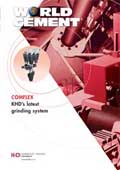Editorial comment
By the time this issue is winging its way to you, The London Summit 2009 will be underway. Here, the leaders of the G20 nations will gather to discuss the best way out of the current financial crisis, with the goals of the Summit identified as: secure global economic recovery; agree the contours of a strengthened financial system; and agree principles, priorities and process for the reform of the IFIs (International Financial Institutions).
Register for free »
Get started now for absolutely FREE, no credit card required.
By the time this issue is winging its way to you, The London Summit 2009 will be underway. Here, the leaders of the G20 nations will gather to discuss the best way out of the current financial crisis, with the goals of the Summit identified as: secure global economic recovery; agree the contours of a strengthened financial system; and agree principles, priorities and process for the reform of the IFIs (International Financial Institutions). No small task indeed, but certainly it would be a great feat to tick these items off the global ‘to do’ list and get to work on converting theory into action. So, what suggestions are likely to surface during the Summit? Russia, for one, has been quick off the starting blocks, publishing its proposals for the reformation of the world financial regulatory system. As well as asserting the importance of continued globalisation over protectionism and a ‘return to isolationism and economic egoism’, Russia suggests a diversified system of reserve currencies: specifically, either introducing more currencies to the reserve list or bringing in a ‘supra-national reserve currency’. Both options, it is suggested, should be studied by the IMF to test their viability. It would be very interesting to see the results of such a study, and the implications of a supra-national currency on internationally traded products, such as, say, cement.
In any event, all this talking seems to be like an interval between first and second acts, during which the players may take the opportunity to work out the ending. In ‘Using the crisis to remake the market’, Harvard Law School Professor Roberto Mangabeira Unger describes how finance has become divorced from the real economy: ‘finance, instead of turning outward to the real economy, turns inward to itself,…to a trading of positions that often has the real economy more as its pretext than as its concern’. In order to achieve efficient reform, Unger argues, financiers must be reminded of the real reason for finance – i.e. production and consumption. In other words, it must become more about trade, about supply and demand, than about speculation and gambling. He presents the crisis as an opportunity for change: a time to rethink the parts of the system that are not working. ‘Change’ is a bit of a buzzword lately, and ‘opportunity’ is a term that is generally overused, but don’t let clichés put you off: he might have a point. For many cement plants, this is a time of great uncertainty. How long will it take for government stimulus packages to translate into orders, and will those orders be sufficient to keep plants running? Shutdowns are being reported practically on a weekly basis, but perhaps these too should be considered an opportunity for change. This ‘slow’ time could be the cement industry’s opportunity to give full thought to plant optimisation and costreduction. Besides which, alongside the financial crisis, the battle against climate change continues to rage, and authorities are stamping down on heavy polluters, dolling out hefty fines in the process. Maintenance and modernisation looks the expensive option, but what price doing nothing? Food for thought begins in this issue on page 62, with an article on waste heat recovery from China's School of Energy and Power, and continues with our feature on environmental upgrades and emissions monitoring.


